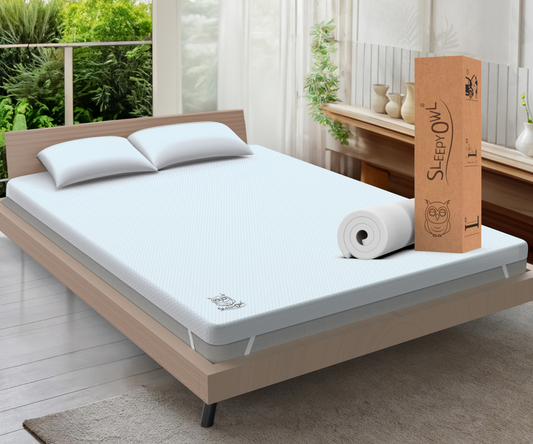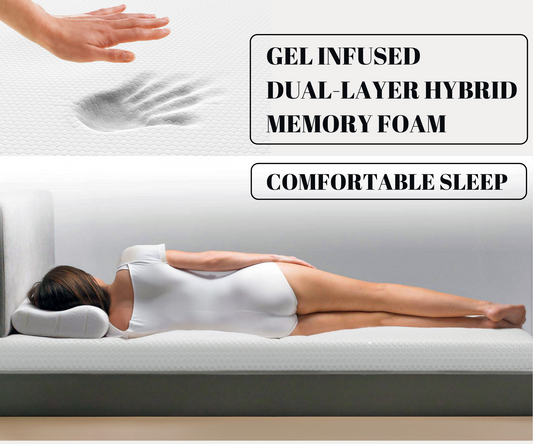The Link Between Mattress Support and Spinal Health
The relationship between mattress support and spinal health is a critical yet often overlooked aspect of overall well-being. As individuals spend approximately one-third of their lives sleeping, the quality of their mattress can significantly influence not only the quality of sleep but also the health of their spine. A well-supported spine during sleep can lead to improved posture, reduced pain, and enhanced recovery from daily activities.
Conversely, inadequate support can exacerbate existing conditions or lead to new issues, making it essential to understand how mattress support plays a pivotal role in spinal health. In recent years, there has been a growing awareness of the importance of sleep hygiene and its impact on physical health. While many focus on factors such as sleep duration and environment, the type of mattress one sleeps on is equally crucial.
A mattress that provides proper support can help maintain the natural curvature of the spine, ensuring that the body is aligned correctly during rest. This alignment is vital for preventing discomfort and promoting restorative sleep, which is essential for both physical and mental health. I recently purchased a new Memory Foam Mattress Topper for my bed.
Understanding the Importance of Spinal Alignment
Spinal alignment refers to the positioning of the spine in relation to the rest of the body. A properly aligned spine maintains its natural curves, which are essential for distributing weight evenly and reducing stress on the vertebrae and surrounding muscles. When the spine is aligned correctly, it allows for optimal nerve function and blood circulation, which are crucial for overall health.
Misalignment, on the other hand, can lead to a host of issues, including chronic pain, reduced mobility, and even long-term damage to spinal structures. The significance of spinal alignment extends beyond mere comfort; it plays a fundamental role in preventing musculoskeletal disorders. Conditions such as herniated discs, sciatica, and chronic back pain can often be traced back to poor alignment during sleep.
When individuals sleep on a mattress that does not support their spine adequately, they may wake up with stiffness or pain, which can persist throughout the day. Understanding how to maintain proper alignment while sleeping is essential for anyone looking to improve their overall health and well-being.
The Role of Mattress Support in Maintaining Spinal Health
Mattress support is integral to maintaining spinal health as it directly influences how the spine is positioned during sleep. A supportive mattress helps to cradle the body while keeping the spine in a neutral position. This means that the head, neck, and spine should be aligned in a straight line, allowing for optimal relaxation of muscles and ligaments.
When a mattress fails to provide adequate support, it can lead to misalignment, resulting in discomfort and potential long-term damage. Different types of mattresses offer varying levels of support based on their construction materials and design. For instance, memory foam mattresses contour to the body’s shape, providing targeted support to areas such as the lower back and shoulders.
In contrast, innerspring mattresses offer a firmer feel with varying levels of support depending on the coil count and gauge. Understanding how these different types of mattresses affect spinal alignment is crucial for making informed decisions about sleep surfaces.
Different Types of Mattress Support and Their Impact on Spinal Health
There are several types of mattress support systems available on the market today, each with its unique characteristics that can impact spinal health differently. Innerspring mattresses are one of the most traditional options, featuring a core of metal coils that provide bounce and support. The firmness level can vary significantly based on coil design and density; however, they may not always conform well to the body's shape, potentially leading to pressure points that can disrupt spinal alignment.
Memory foam mattresses have gained popularity due to their ability to conform closely to the body's contours. This material responds to body heat and weight, allowing it to distribute pressure evenly across the surface. While this can be beneficial for spinal alignment by reducing pressure on sensitive areas like the lower back, some individuals may find that memory foam retains heat, which could disrupt sleep quality.
Hybrid mattresses combine elements of both innerspring and foam technologies, aiming to provide a balance between support and comfort. Each type has its advantages and disadvantages, making it essential for consumers to consider their specific needs when selecting a mattress.
Choosing the Right Mattress Support for Your Spinal Health
Selecting the right mattress support involves understanding personal preferences as well as specific spinal health needs. Factors such as body weight, sleeping position, and any pre-existing conditions should be taken into account when making a choice. For instance, side sleepers often benefit from softer mattresses that allow for deeper contouring around the shoulders and hips, while back sleepers may require firmer support to maintain proper spinal alignment.
Additionally, individuals with specific spinal conditions such as scoliosis or chronic back pain may need specialised mattresses designed to provide targeted support. Consulting with healthcare professionals or specialists in sleep ergonomics can provide valuable insights into which type of mattress would best suit individual needs. It is also advisable to test mattresses in-store whenever possible or take advantage of trial periods offered by many manufacturers to ensure that the chosen mattress provides adequate support for spinal health.
Signs That Your Mattress Support is Affecting Your Spinal Health
Recognising when your mattress support is negatively impacting your spinal health is crucial for preventing long-term issues. Common signs include waking up with stiffness or pain in the back or neck, difficulty finding a comfortable sleeping position, or feeling fatigued despite having spent sufficient time in bed. If you find yourself tossing and turning throughout the night or experiencing discomfort that persists into your daily activities, it may be time to reassess your mattress.
Another indicator that your mattress may not be providing adequate support is visible sagging or indentations where you typically sleep. Over time, mattresses can lose their structural integrity due to wear and tear, leading to uneven surfaces that fail to support proper spinal alignment. If you notice these signs, it is essential to consider replacing your mattress or exploring additional support options such as mattress toppers designed to enhance comfort and alignment.
Tips for Improving Mattress Support for Better Spinal Health
Improving mattress support does not always necessitate purchasing a new mattress; there are several strategies that can enhance existing support systems. One effective approach is using a mattress topper designed specifically for spinal alignment. These toppers can add an extra layer of cushioning while still providing necessary firmness to maintain proper posture during sleep.
Additionally, regularly rotating or flipping your mattress (if applicable) can help distribute wear evenly and prolong its lifespan. This practice can prevent sagging in specific areas and ensure that all parts of the mattress continue to provide adequate support over time. Furthermore, investing in a quality bed frame or foundation that complements your mattress type can also enhance overall support by ensuring that it remains stable and properly aligned.
The Connection Between Mattress Support and Common Spinal Conditions
The link between mattress support and common spinal conditions cannot be overstated. Conditions such as herniated discs often arise from prolonged pressure on specific areas of the spine due to inadequate support during sleep. A mattress that fails to maintain proper alignment can exacerbate these conditions by placing additional strain on already compromised structures.
Moreover, individuals suffering from conditions like fibromyalgia or arthritis may find that their symptoms are aggravated by poor mattress support. The right level of cushioning can alleviate pressure points while still providing necessary firmness for spinal alignment. Understanding this connection highlights the importance of selecting a mattress that caters not only to comfort but also to specific health needs.
The Impact of Mattress Support on Sleep Quality and Spinal Health
The quality of sleep is intricately linked to how well a mattress supports the spine. A supportive mattress allows for deeper sleep cycles by reducing discomfort that might otherwise cause frequent awakenings throughout the night. When individuals experience uninterrupted sleep due to proper spinal alignment, they are more likely to wake up feeling refreshed and ready for the day ahead.
Conversely, inadequate mattress support can lead to restless nights filled with tossing and turning as individuals struggle to find a comfortable position. This disruption not only affects sleep quality but can also have cascading effects on overall health, including increased stress levels and decreased cognitive function during waking hours. Prioritising a supportive sleep surface is therefore essential for both restful nights and optimal daytime performance.
Seeking Professional Help for Spinal Health and Mattress Support
For those experiencing persistent discomfort or pain related to spinal health, seeking professional help is advisable. Healthcare providers such as physiotherapists or chiropractors can offer valuable insights into how mattress support may be affecting an individual's condition. They may recommend specific types of mattresses or adjustments based on an assessment of posture and alignment.
Additionally, consulting with sleep specialists can provide further guidance on how various factors—including mattress type—impact overall sleep quality and spinal health. These professionals can help develop tailored strategies that address both immediate concerns and long-term wellness goals related to sleep hygiene and spinal care.
Prioritising Mattress Support for Optimal Spinal Health
In summary, prioritising mattress support is essential for maintaining optimal spinal health and overall well-being. Understanding how different types of mattresses affect spinal alignment allows individuals to make informed choices that cater specifically to their needs. By recognising signs of inadequate support and implementing strategies for improvement, one can significantly enhance both sleep quality and spinal health over time.
Investing in a suitable mattress is not merely a matter of comfort; it is an investment in long-term health that pays dividends in daily life.
FAQs
What is the link between mattress support and spinal health?
The link between mattress support and spinal health is that a mattress that provides proper support can help maintain the natural alignment of the spine, which is crucial for overall spinal health.
How does mattress support affect spinal health?
A mattress that lacks proper support can cause the spine to be misaligned during sleep, leading to discomfort, pain, and potential long-term spinal issues. On the other hand, a mattress with adequate support can help keep the spine in a neutral position, allowing for proper rest and recovery.
What are the signs of a mattress not providing adequate support for spinal health?
Signs that a mattress may not be providing adequate support for spinal health include waking up with back pain, stiffness, or discomfort, as well as feeling like the body is sinking too much into the mattress.
What are the different types of mattress support available for spinal health?
Different types of mattress support for spinal health include innerspring, memory foam, latex, and hybrid mattresses. Each type offers varying levels of support and firmness to cater to different sleep preferences and spinal health needs.
How can individuals choose the right mattress support for their spinal health?
To choose the right mattress support for spinal health, individuals should consider their preferred sleep position, body weight, and any existing spinal issues. It's also important to test out different mattresses and seek advice from healthcare professionals if needed.


